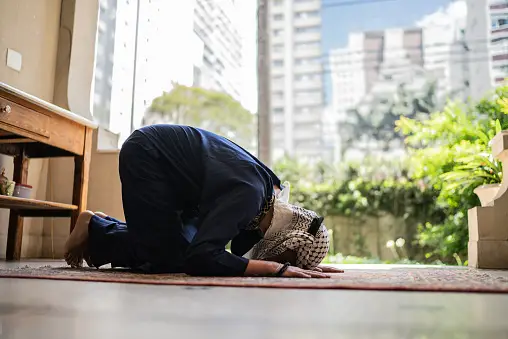Common Questions on Salah
Islamic prayer, or Salah, plays a vital role in a Muslim’s life. It’s crucial to perform it correctly and deal with various scenarios that may arise during prayer. We will explore some common questions related to Salah, offering answers and insights to enhance your understanding of Common Questions on Salah of Islamic prayer practices.
Handling Interruptions during Prayer
Question: What should you do if someone comes to your door while you’re praying?
In the case of an interruption during prayer, you can break your prayer to attend to the person at the door, especially if there’s an urgent matter. Instead of abruptly ending your prayer, say “Subhan Allah” for men or clap your hands for women. This practice aligns with the teachings of the Prophet Muhammad (peace be upon him).
Praying at Home in the Imam’s Lead
Question: Can a woman pray at home while following the imam’s lead in the mosque through sound?
In general, a woman cannot pray at home while following the imam in the mosque through sound. Islamic jurisprudence does not consider this practice valid. As for the prayers a woman has prayed in this manner in the past, they are still valid. However, consult your community’s Islamic scholars for specific situations like this.
Reciting the Quran during Tahajjud
Question: Is it permissible to recite the Quran while looking at it during Tahajjud prayer?
Yes, you can recite the Quran while looking at it during Tahajjud prayer, especially if you have only memorized a limited portion of the Quran. This practice is in line with Islamic teachings and allows individuals to fulfill their prayer obligations without hindrance.
Raising Hands in Supplication
Question: When should you raise your hands in supplication during prayer?
Raising your hands in supplication, known as Qunut, is permissible during Witr prayer because this Qunut is part of the Nazla (occasional) category of prayers. The Prophet Muhammad (peace be upon him) used to raise his hands while making supplications during Qunut Nazla. This practice is considered a Sunnah and is recommended during the appropriate prayers.
Last Time for Witr Prayer
Question: What is the last possible time to recite Witr prayer?
The last time to recite Witr prayer is until the break of dawn (Fajr). If you fear that dawn is approaching, perform one rak’ah of Witr prayer, and this will complete your Witr prayer for the night.
Covering Feet and Palms during Women’s Prayer
Question: Should a woman’s feet and palms be uncovered during prayer, especially when she prays at home and not in front of men?
According to the Hanbali school of thought, followed by some scholars, a free adult woman should cover her entire body, including her hands and feet, except for her face during prayer, even when praying at home. This is considered the most conservative approach. However, it’s important to note that there are differing opinions on this matter, and women have the freedom to choose the interpretation that aligns with their beliefs and comfort level.
Understanding the nuances of Islamic prayer practices is essential for every Muslim. Addressing common questions and scenarios that may arise during prayer can help ensure that your Salah is performed correctly and in accordance with your beliefs and practices. Always seek guidance from knowledgeable scholars and religious authorities when in doubt about specific prayer-related issues.
More Fact: Sajdah recitation

